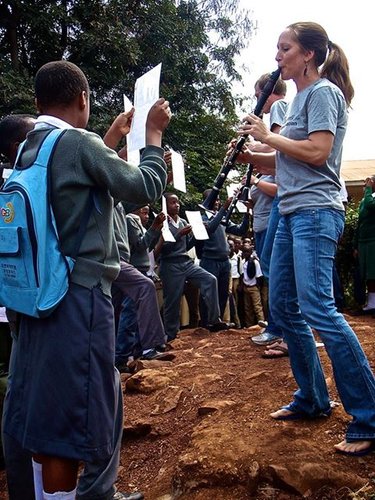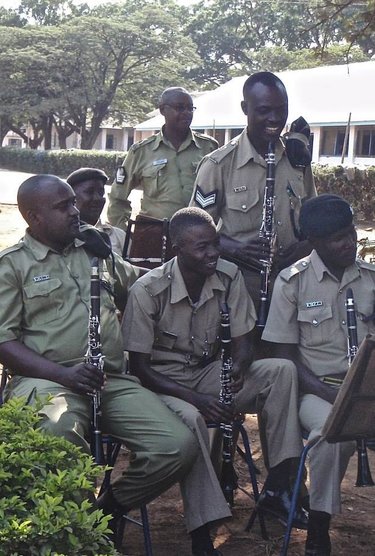Holiday concert hits a high note for global care
— Photo by Brad Rodriquez
Music to plant by: A student at Karanga Primary School holds a sheet of music for Michele Von Haugg, right, as she, along with her C4C team members, plays music to begin a tree-planting program. The impromptu concert is followed by a short lecture in Swahili about trees — in Swahili, “karanga,” the name of the school, means “peanut.” The program ends with student planting mpingo trees, an endangered species that produces the wood used to make clarinets.
— Photo by Brad Rodriquez
Music to salute to: The clarinet players of the Moshi Police Academy Band listen to the opening of “Mungu Ibariki Afrika,” the Tanzanian national anthem, which translates as “God Bless Africa.” This rendition was arranged by Brett Wery from Schenectady County Community College. The cadets smiled when they heard, for the first time, the use of flutter, a technique used to emulate African sounds.
The Enterprise — Melissa Hale-Spencer
Tickling the ivories: Vincent Smith, a retired Berne-Knox-Westerlo music teacher, shown here performing in the pit orchestra for last weekend’s production of Bah, Humbug! has composed a piece for organ and clarinet, which will premier on Dec. 5 in Berne at the Clarinets for Conservation concert. Mpingo was once used for the black keys of the piano as ivory was for the white; it is still used to make clarinets. The concert will raise funds to help restore the mpingo tree, native to Tanzania.
BERNE — On Dec. 5, Christmas concert-goers here can listen to distinctively American music with African roots — jazz.
This is appropriate since the concert will benefit a native Hilltowner’s mission to help save the tree in Tanzania from which the clarinet comes, and also to teach Tanzanians to play the instrument she loves.
“Clarinets for Conservation” will celebrate the holidays with this cause in mind — the students of Moshi, Tanzania, and the mpingo tree.
Founded in 2010, Clarinets for Conservation, C4C, is a not-for-profit that travels to Moshi, Tanzania to teach music and the arts to students, and to plant mpingo trees, from which many musical instruments are made.
Classical music, traditional holiday tunes, jazz — Skip Parsons Dixieland and all that Jazz is on the program — will all be performed.
“It will definitely not be boring,” says Michele Von Haugg of the free concert. an East Berne native, Von Haugg is the founder and director of C4C.
The concert will feature four local musicians, including Von Haugg and Vincent Smith, an organist who will premiere a piece for organ and clarinet that Smith is currently composing. Smith was Von Haugg’s first music teacher at Berne-Knox-Westerlo.
During the program, C4C members will explain their mission and tell stories about their time in Moshi. They might mention that the students at Korongoni Secondary School had never seen a clarinet prior to Von Haugg’s first visit in 2010.
At the reception, holiday gifts, from bowls to Vera Bradley merchandise, will be raffled, and handmade items from Tanzania such as jewelry will be for sale.
“So, a little bit of everything,” says Von Haugg.
Since 2012, C4C has more than doubled its teaching staff in Moshi, from two to five teachers, and added three teaching assistants and one student teacher. Last year, C4C planted 647 mpingo trees, valued at $16 million when fully matured and harvested.
All profits are to go to children in the schools and orphanages of Moshi. “These kids are supposed to get every fat cent of those trees,” says Von Haugg.
C4C is currently working to get a promise from the government on paper. “They could give us a written promise…and they could steal them anyway,” says Von Haugg. But she is hopeful. “Things are getting better all the time.”
Partnership with police
This past May, C4C formed a powerful partnership with the Police Academy of Moshi. The academy, Tanzania’s equivalent of West Point, says Von Haugg, trains young men to become police and traffic-control officers, and to enter the military.
It all began with trees. The town of Moshi is nestled at the bottom of Mount Kilamanjaro. The mountain’s snow has been melting due to climate change and also because trees are being cut in its foothills. Without moisture from forests, dry winds, rather than wet, blow on the ice, causing it to evaporate. To prevent water from drying up, Von Haugg said, the government, in 2012, required that all schools have trees on campus.
Von Haugg, along with the African Blackwood Conservation Project, helped the Police Academy to meet this requirement by creating a tree nursery of 500 mpingo trees.
C4C also worked with the academy’s band, teaching and repairing their instruments, which “definitely needed some love,” says Von Haugg, and were “held together by sewing string.”
In return, the Police Academy has promised to check on local schools like Korongoni Secondary, and to protect trees.
The academy has also promised to give five full-time teaching jobs to the first Korongoni graduates who pass an exam that tests musical skills and conservation knowledge.
“They’re not just learning music,” says Von Haugg of the Korongoni students. “They’re also learning about the environment, where the music is coming from, and how to sustain the environment.”
Since C4C’s partnership, the Moshi community has become more comfortable with the Police Academy. “They’re meant to be intimidating,” says Von Haugg of those in the academy, “in that they’re meant to be protectors.”
She also sees things from the other side. “Community members can be intimidated by a man in combat gear and carrying a rifle,” she says.
C4C’s collaboration with the academy has softened this image. “For the community to see a soldier playing an instrument and planting a tree brings about a feeling of comfort and ease, and peace.”
Finances and hope
At the end of last month, C4C received not-for-profit status. After almost a year of dealing with the Internal Revenue Service, Von Haugg said, “We smartened up and got a lawyer.” Now, C4C can accept tax-exempt donations.
When Von Haugg started C4C, she took on most of the financial costs. The money situation isn’t much better now, but C4C still makes ends meet with fund-raising and concerts. Von Haugg works as a private teacher, restaurant server, nanny, freelance musician, and “anything at the kitchen sink that will pay the bills,” she says.
When she was in her early 20s, over a decade ago, Von Haugg played in the Air Force Band, where she got paid the first and 15th of every month, had a retirement plan, and insurance of all sorts —medical, dental eye care.
“I had the whole nine yards, and 30 days a year paid vacation,” says Von Haugg, “and that was great.”
But there wasn’t a lot of artistic freedom, and after 10 years, she asked herself, “is this something that’s really fulfilling me as an artist, as an educator, as a musician — or is it not?” Her answer: “It wasn’t.”
Many years later, after earning her master’s degree at the New England Conservatory, and entering the doctoral program at Arizona State University, her living is more precarious. “Now if I break a thumb, you know what, I’m screwed…And that’s the same for so many musicians,” says Von Haugg.
In the midst of this, Von Haugg keeps in mind her plans and hope. Within three years, she wants to begin building the first Center for Arts in Korongoni Secondary, and to complete it within five. The center will have at least four classrooms and a performance stage.
Von Haugg’s dreams sustain her.
As she says, “If you love it, you just have to do it.”
****
Clarinets for Conservation will benefit from a Dec. 5 concert at the First Reformed Church of Berne, also sponsored by the Helderberg Evangelical Lutheran Church.
The concert, at 1663 Helderberg Trail in Berne, starts at 7 p.m. and will be followed by a reception.
Performers include Stacia Burns on bagpipes, Michele Von Haugg on clarinet, Vincent Smith on organ, Meara Mctague who will sing and play strings, and Skip Parsons Dixieland and All that Jazz.
The performance will feature a variety of classical and contemporary works performed on instruments manufactured with African blackwood.
Admission is free and open to the public.

